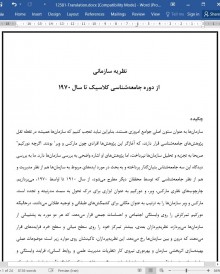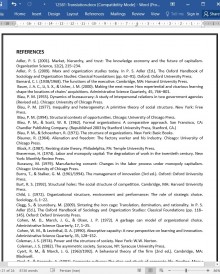
دانلود مقاله نظریه سازمانی: از دوره جامعه شناسی کلاسیک تا سال 1970
چکیده
سازمانها به عنوان ستون اصلی جوامع امروزی هستند. بنابراین نباید تعجب کنیم که سازمانها همیشه در نقطه ثقل پژوهشهای جامعهشناسی قرار دارند، که آغازگر این پژوهشها افرادی چون مارکس و وِبر بودند. اگرچه دورکیم صریحا به تجزیه و تحلیل سازمانها نپرداخت، اما پژوهشهای او اشاره واضحی به بررسی سازمانها دارد. ما به بررسی دیدگاه این سه جامعهشناس بنیانگذار پرداخته و به بحث در مورد ایدههای مربوط به سازمانها هم از نظر مدیریت و هم از نظر جامعهشناسی که توسط محققان دیگر مطرح میشود، از سال 1910 تا اواسط 1970، میپردازیم. چارچوبهای نظری مارکس، وِبر، و دورکیم به عنوان ابزاری برای درک تحول به سمت مدرنیته و تجدد است. مارکس و وِبر سازمانها را به ترتیب به عنوان مکانی برای کشمکشهای طبقاتی و توجیه عقلانی میدانند، درحالیکه دورکیم تمرکزش را روی وابستگی اجتماعی و احساسات جمعی قرار میدهد، که هر دو مورد به پشتیبانی از سازمانها میپردازد. نظریهپردازان بعدی، بیشتر تمرکز خود را روی سطح میانی و سطح خرد فرایندهای قرار میدهند که درون و بین سازمانها رخ میدهد. این نظریهپردازان، تاکیدشان روی موارد زیر است: موضوعات عملی بهینهسازی اثربخشی سازمان و بهرهوری نیروی کار (نظریات مدیریت علمی و روابط انسانی)، فرایند وابستگی و سلسلهمراتب (سیمل) ، محدودیتها در ارتباط با تصمیمگیری عقلانی، (مکتب کارنگی) ، و شرایط سازمانی که فرایندها و نتایج سازمانی را شکل میدهد (نظریه اقتضایی). این مقاله به شرح سه جنبه (آمترب، رابطهای، و فرهنگی) میپردازد که روی پژوهشهای جامعهشناختی سازمانها از اواسط 1970، تاثیرگذار بوده است.
1. مقدمه
هدف ما اینست که تاریخ نظریه سازمانی را مورد بررسی قرار دهیم. اما پیش از شروع کار، باید به شفافسازی این اصطلاح- یعنی مفهوم «سازمان» و «نظریه» به طور ویژه بپردازیم. سازمانها، مجموعهای از افراد، داراییهای مادی، منابع مالی، و اطلاعات است، که اعضای ان دارای اهداف مشترکی هستند که با همکاری هم به دنبال تحقق آن هستند. مردم زمانی سازمانها را ایجاد میکنند که به تنهایی و در قالب گروههای غیررسمی کوچک، یا خانوادگی، یا جنبشهای اجتماعی پراکنده قادر به رسیدن به اهداف نیستند. مردم زمانی سازمانهای رسمی را ایجاد میکنند که اقداماتی را که انها باید برای رسیدن به اهدافشان انجام دهند نیازمند نیازمند تلاش مشترک، پایدار، و هماهنگ بسیاری از افراد باشد. سازمانها چیزی بیش از صرفا یک گردهمایی افراد است: به هر حال آنها به عنوان فعالان حاکم و دارای اختیارات حقوقی هستند که دولت در اختیار انها قرار داده است (کولمن، 1974، 1982). این موارد به سازمانها استقلال میدهد، و چنین امکانی را برایشان فراهم میسازد تا افراد را در داخل و خارج قلمرو سازمان، جوامعی که در آن کار میکنند، سازمانهای دیگر، و در کل جامعه را تحت تاثیر قرار دهند (کینگ، فلین، وتن، 2010).
واژه «نظریه» از دیدگاه ما و بسیاری از محققان به عنوان «مجموعه تئوریهایی هستند که در میانه راه قرار دارند» یعنی مجموعه بهمپیوستهای از قضیهها، که حاصل فرضیات در مورد وقایع مهم و مکانیسمهای علت و معلول است که شامل فرضیههای آزمونپذیر از لحاظ تجربی بوده و در ارتباط با مجموعه مشخصی از پدیده اجتماعی است (مرتون، 1968، صفحه 39-72). از انجاییکه سازمانها به عنوان بخش اصلی جامعه امروزی هستند (پیرو، 1991) ، جای تعجب نیست اگر عنوان کنیم که نظریههای سازمانی توسط محققان در بسیاری از رشتهها همچون: جامعهشناسی، اقتصاد، علوم سیاسی، و مدیریت، مطرح شده است. در اینجا ما تمرکزمان را روی نظریههای سازمانی قرار میدهیم که مرتبط با جامعهشناسی و مدیریت است. در عین حال که تفاوتهایی بین این دو گروه وجود دارد- یعنی جامعهشناسان تمرکز خود را روی این موضوع قرار میدهند که درواقع چگونه سازمانها فعالیت میکنند و چگونه جامعه را تحت تاثیر قرار میدهند، از طرف دیگر محققان رشته مدیریت تمرکز خود را روی این موضوع قرار میدهند که چرا و چگونه سازمانها اثربخش و دارای بازدهی هستند- اما این دو گروه به مدت 50 سال با یکدیگر کار کرده، و مشترکا مجموعهای از آثاری را تهیه کردهاند که هسته نظریه سازمانی را شکل داده است. ما به معرفی سه نقطه اغاز نظریه سازمانی در جامعهشناسی کلاسیک پرداخته و سپس به بحث در مورد محققان شناختهشده دیگر در اواسط دهه 1970 میپردازیم. در این مقاله (هاومن و وت، 2018) ، ما به تعریف سه جنبه سازمانی میپردازیم که روی پژوهشهای معاصر برای چهار دهه گذشته تاثیرگذار بوده است.
4. نتیجهگیری
در این مقاله، به بررسی پیشینه نظریه سازمانی از دیدگاه مارکس، وبر، و دورکیم، در محدوده زمانی اواسط 1970 پرداختیم. با توجه به اهمیت این نظریه در جوامع مدرن، جای تعحب نیست که سازمانها به عنوان موضوعی برای بررسی توسط جامعهشناسان، از زمان آغاز این رشته، مد نظر قرار داده میشوند. زندگی اجتماعی، در بافت سازمانهای رسمی رخ میدهد؛ مردم از سازمانها برای پیگیری اهداف اقتصادی، اجتماعی، فرهنگی و سیاسی استفاده میکنند؛ و سازمانها به عنوان محلی هستند که منابع ارزشمندی همچون درامد و اعتبارات علمی اعطا میگردد. بنابراین، سازمانها به عنوان مرکز فرایندهایی هستند که در قلب بررسیهای جامعهشناختی همچون طبقهبندی، شکلگیری شبکه، و بسیج سیاسی قرار دارند.
با توجه به ظهور کاپیتالیسم صنعتی، مارکس، وبر، و دورکیم به توصیف سازمانها در یک جارچوب نظری گستردهتر به منظور درک جوامع امروزی پرداختند. طبق نظر مارکس، کشمکشهای طبقاتی که به عنوان یکی از محرکهای اصلی سابقه است، محیطهای کاری نه تنها به عنوان یک عرصه ازخودبیگانگی، بهرهکشی، و سلطه کارگران است، بلکه جایی است که کارگران میتوانند در آن به یک آگاهی طبقاتی متحولانه دست یابند. طبق نظر وبر، توجیه عقلانی فعالیتهای انسانی که به عنوان نشانه عیار مدرنیته است، شکل ایدهال خود را از یک سازمان بروکراتیک حقوقی-عقلایی بدست میآورد. از نظر دورکیم، بالا رفتن تخصص در بافت سازمانهای متمایز، نشانه تغییر از جامعه سنتی به جامعه مدرن است، که نیازمند فرمهای یکپارچهای است که از طریق وابستگی متقابل بجای شباهتها حاصل میشود. این جنبهها روی نقشهایی که سازمانها در جوامع امروزی ایفا میکنند، همجنان امروزه دارای تاثیر زیادی است.
Abstract
Organizations are the fundamental building blocks of modern societies. So it is not surprising that they have always been at the center of sociological research, starting with Marx and Weber. And although Durkheim did not explicitly analyze organizations, his work has clear implications for the study of organizations. We review the insights of these three pioneering sociologists and then discuss ideas about organizations proposed by other scholars, from both management and sociology, from 1910 to the mid-1970s. Marx, Weber, and Durkheim's theoretical frameworks were tools for understanding the transition to modernity. Marx and Weber saw organizations as sites of class struggle and rationalization, respectively, while Durkheim focused on social cohesion and collective sensemaking, both of which underpin organizations. Later theorists focused more closely on the meso-level and micro-level processes that happen within and between organizations. These later theorists emphasized pragmatic concerns of optimizing organizational efficiency and labor productivity (scientific management and human relations theories), processes of affiliation and hierarchy (Simmel), limits to rational decision-making (the Carnegie School), and environmental conditions that shape organizational processes and outcomes (contingency theories). A companion paper describes the three perspectives (demographic, relational, and cultural) that have dominated sociological research on organizations since the mid-1970s.
1 INTRODUCTION
Our goal is to lay out the history of organizational theory. But before we begin, we want to be clear about terminology—about the meaning of “organization” and “theory” in particular. Organizations are collections of people, material assets, financial resources, and information, whose members have common goals that they cooperate to pursue. People create organizations when they cannot achieve their goals by working alone, in small informal groups, in families, or in dispersed social movements. People create formal organizations when the actions they must undertake to achieve their goals require the joint, sustained, and coordinated efforts of many people. Organizations are more than mere collections of individuals however: they are sovereign actors, with legal powers bestowed by the state (Coleman, 1974, 1982). This gives them autonomy, allowing them to influence individuals inside and outside their boundaries, the communities in which they operate, other organizations, and society at large (King, Felin, & Whetten, 2010).
Theory, to us and many other scholars, is “theories of the middle range,” meaning logically interconnected sets of propositions, derived from assumptions about essential facts and causal mechanisms that yield empirically testable hypotheses and deal with some delimited set of social phenomena (Merton, 1968, pp. 39–72). Because organizations are the fundamental building blocks of modern society (Perrow, 1991), it is not surprising that theories of organizations have been proposed by scholars in many fields: sociology, economics, political science, and management. Here, we focus on theories of organizations developed in sociology and management. While there are differences between the two groups—sociologists tend to focus on how organizations actually operate and how they affect society, while management scholars tend to focus on how and why organizations are effective and efficient—the two groups have interacted for the past 50 years, collectively creating a body of work that is the core of organizational theorizing. We present three starting points for organizational theory in classical sociology, and then discuss the work of other important scholars up to the mid‐1970s. In a companion paper (e.g., Haveman & Wetts, 2018), we introduce the three perspectives on organizations that have dominated contemporary research for the past four decades.
4 CONCLUSION
Here, we have summarized the history of organizational theory from the writings of Marx, Weber, and Durkheim up through the mid‐1970s. Given their importance in modern societies, it is not surprising that organizations have been a site of inquiry for sociologists since the beginning of the discipline. Much of social life occurs in the context of formal organizations; people use organizations to pursue their economic, social, cultural, civic, and political goals; and organizations are sites at which valuable resources such as income and educational credentials are conferred. Organizations are therefore central to processes that are at the heart of to sociological inquiry, such as stratification, network formation, and political mobilization.
Observing the emergence of industrial capitalism, Marx, Weber, and Durkheim described organizations within larger theoretical frameworks for understanding modern societies. For Marx, who emphasized class struggle as one of the fundamental drivers of history, workplaces were arenas of alienation, exploitation, and domination of workers, but also places where workers could forge a revolutionary class consciousness. For Weber, the rationalization of human activities that was the hallmark of modernity found its ideal‐typical embodiment in rational‐legal bureaucratic organization. For Durkheim, increasing specialization in the context of differentiated organizations marked the transition from traditional to modern societies, necessitating forms of solidarity characterized by interdependence rather than similarity. Their perspectives on the roles that organizations play in modern society continue to exert broad influence today
چکیده
1. مقدمه
2. دیدگاه جامعهشناسان کلاسیک در مورد سازمانها
2.1 کارل مارکس
2.2 مکس وِبر
2.3 امیل دورکیم
3. نظریات سازمانی دیگر
3.1 جورج سیمل
3.2 مدیریت علمی
3.3 روابط انسانی
3.4 مکتب کارنگی: نظریه تصمیمگیری سازمانی
3.5 نظریه اقتضایی
4. نتیجهگیری
منابع
Abstract
1 . INTRODUCTION
2 . CLASSICAL SOCIOLOGISTS ON ORGANIZATIONS
2.1 . Karl Marx
2.2 .Max Weber
2.3 . Émile Durkheim
3 . OTHER THEORIES OF ORGANIZATIONS
3.1 . Georg Simmel
3.2 . Scientific management
3.3 .Human relations
3.4 .The Carnegie School: A decision‐making theory of organizations
3.5 .Contingency theories
4 . CONCLUSION
REFERENCES
- اصل مقاله انگلیسی با فرمت ورد (word) با قابلیت ویرایش
- ترجمه فارسی مقاله با فرمت ورد (word) با قابلیت ویرایش، بدون آرم سایت ای ترجمه
- ترجمه فارسی مقاله با فرمت pdf، بدون آرم سایت ای ترجمه


